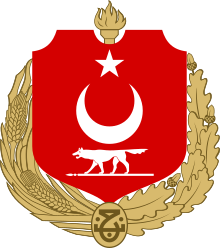


Asena is the name of a she-wolf associated with the Gokturk foundation myth.[1] The ancestress of the Göktürks is a she-wolf, mentioned yet unnamed in two different "Wolf Tales".[2] The legend of Asena tells of a young boy who survived a battle; a female wolf finds the injured child and nurses him back to health. The she-wolf, impregnated by the boy, escapes her enemies by crossing the Western Sea to a cave near the Qocho mountains and a city of the Tocharians, giving birth to ten half-wolf, half-human boys. Of these, Yizhi Nishidu[3] becomes their leader and establishes the Ashina clan, which ruled over the Göktürk and other Turkic nomadic empires.[4][5]
In certain cultural narratives and mythological accounts, the character of Asena, with its symbolic association to a she-wolf, is denoted by the name "Bozkurt" (meaning Gray Wolf in Turkish), embodying a significant archetype with multifaceted connotations.[6]
With the rise of Turkish ethnic nationalism in the 1930s, the veneration of figures of Turkic Mythology, such as Bozkurt, Asena and Ergenekon was resurgent.
The Turkish Air Force's Boeing KC-135 Stratotanker tanker squadron is nicknamed ''Asena''.
Leader of the Turkish nationalist İYİ Parti Meral Akşener is nicknamed Asena.[7]
|
| |
|---|---|
| First Turkic Khaganate (552–581) |
|
| Eastern Turkic Khaganate (581–630) |
|
| Western Turkic Khaganate (581–657) |
|
| Second Turkic Khaganate (682–744) |
|
| Western Turks under Jimi system |
|
| Göktürk culture |
|
| Göktürk wars and battles |
|
| Titles |
|
| Family |
|